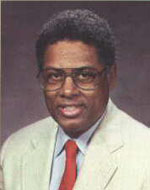|
|

Jewish World Review / July 10, 1998 / 16 Tamuz, 5758
Thomas Sowell
"YOU'RE HISTORY!" is one of the popular ways of dismissing someone
today.
Unfortunately, in too many of our schools and colleges today, history itself
is "history."
In many places, history has been replaced by "social studies" -- a
politically correct rendition of current social issues. When there is
history, all too often it is "revisionist" history that looks back through the past
to find things to denounce about America or about Western civilization.
Even the biggest and oldest scholarly organization of historians --
the
American Historical Association -- has gone politically correct. Not only
have
they become a lobbying group for various government policies, they take
political positions on things that have nothing to do with history -- AIDS,
environmentalism and "gender diversity," for example.
Too many historians, like too many other academics today, look upon
scholarship and education as an opportunity to carry on politics by other
means. To these politicized professors, the lectern is a soap box and the
students are potential disciples in ideological crusades.
Not everyone in the history profession takes this view, of course.
But few
have stood up to the strident ideologues, who have often been allowed to
become the tail that wags the dog. Now, at last, an alternative organization
for historians in taking shape.
The new organization is called the Historical Society. Its leader,
distinguished historian Eugene Genovese, says that it will focus on plain
history -- not the new trinity of race, class and gender, not esoteric
abstractions or the rest of the self-indulgent agenda of those who see
history
as just a means to some ideological end.
Predictably, but sadly, the new organization's motives have been
questioned
and it is being depicted as a bunch of reactionaries who don't want
historians
looking into things like the postwar development of suburbs or NATO policy.
In point of fact, the new Historical Society has no restrictions and
includes
liberals and leftists, as well as conservatives. Far from being uninterested
in racial issues, its founder, Eugene Genovese, has written one of the
classic
books on slavery in the antebellum South and has spent three years at a
black
institution, Atlanta University.
The reckless, false and ad hominem charges against the new
organization give
a painful insight into what is wrong with the old one and with the people
who
have led it down the garden path.
Why is history important? The past is important because the future
is
important. Without history, many people have no idea how many of today's
half-
baked ideas have been tried, again and again -- and have repeatedly led to
disaster. Most of these ideas are not new. They are just being recycled with
retreaded rhetoric.
Ideas that have become fashionable since the 1960s can be found in
the
writings of William Godwin in the 1790s. Ancient Greek tyrants played the
political game of redistributing other people's wealth to the poor as a
means
of gaining despotic power over rich and poor alike. Yet hundreds of millions
of people fell for the same trick in the 20th century -- and tens of
millions
of these people paid with their lives in the Soviet Union under Stalin and
in
China under Mao.
It is not just bad ideas that history makes us aware of. It also
makes us
aware of how rare our good fortune as Americans has been and what has spared
us the traumas that so many other nations have suffered and still suffer
today.
It is not just our economic prosperity, though that is important. We
don't
have to worry about military coups, though there are countries where juntas
have seized power again and again. Even the racial problems of this country
do
not begin to compare to what has happened in the Balkans or Rwanda or Sri
Lanka, much less Nazi Germany.
The people who wrote the Constitution of the United States had a
broad and
deep knowledge of history. That is why they wrote the Constitution the way
they did, to cut off despots at the pass, to keep us from slaughtering each
other over religious differences and to prevent politicians from ruining the
economy.
However well they did their work, only the living can maintain the
benefits
they created. And they can do that only if they understand some of the
lessons
of history that are embodied in our laws and institutions -- which are far
more important than the hot topics of the moment that some choose to call
"the
real
 Honest history
Honest history

7/14/98: Race dialogue: same old stuff
7/10/98: Honest history
7/09/98: Dumb is dangerous
7/02/98: Gun-safety starts with
parental responsibility
6/30/98: When more is less
6/29/98: Are educators above the law?
6/26/98: Random Thoughts
6/24/98: An angry letter
6/22/98: Sixties sentimentalism
6/19/98:Dumbing down anti-trust
6/15/98: A changing of the guard?
6/11/98: Presidential privileges
6/8/98: Fast computers and slow antitrust
6/3/98: Can stalling backfire?
5/29/98: The insulation of the Left
5/25/98: Missing the point in the media
5/22/98: The lessons of Indonesia
5/20/98: Smart but silent
5/18/98: Israel, Clinton and character
5/14/98: Monica Lewinsky's choices
5/11/98: Random thoughts
5/7/98: Media obstruction of justice
5/4/98: Dangerous "safety"
5/1/98:
Abolish Adolescence!
4/30/98: The naked truth
4/22/98: Playing fair and square
4/19/98: Bad teachers"
4/15/98: "Clinton in Africa
"
4/13/98: "Bundling and unbundling
"
4/9/98: "Rising or falling Starr
"
4/6/98: "Was Clinton ‘vindicated'?
"
3/26/98: "Diasters -- natural and political"
3/24/98: "A pattern of behavior"
3/22/98: Innocent explanations
3/19/98: Kathleen Willey and Anita Hill
3/17/98: Search and destroy
3/12/98: Media Circus versus Justice
3/6/98: Vindication
3/3/98: Cheap Shot Time
2/26/98: The Wrong Filter
2/24/98: Trial by Media
2/20/98: Dancing Around the Realities
2/19/98: A "Do Something" War?
2/12/98: Julian Simon, combatant in a 200-year war
2/6/98: A rush to rhetoric